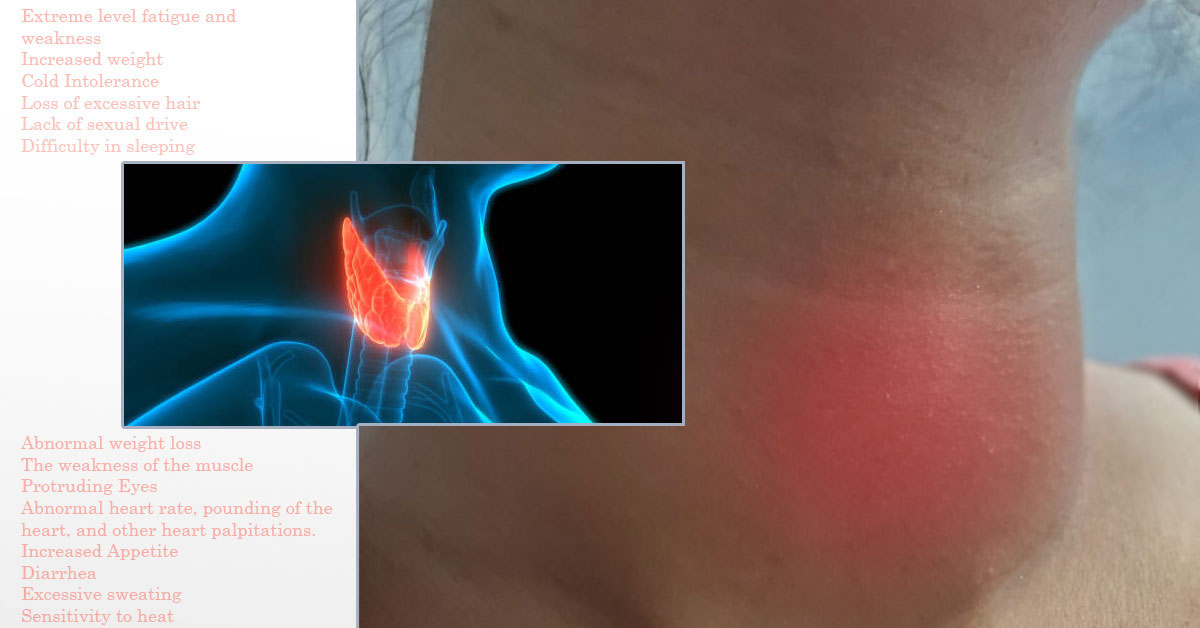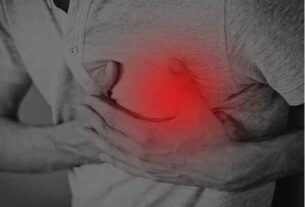Thyroid disorders are most common in women, their signs and symptoms depend on the type of thyroid problem and depend on health status. The thyroid is a butterfly-shaped small gland at the base of your neck that has a vital role in every one of your bodily functions. Our body will create several issues if this gland does not release the required thyroid hormone and this condition is called hypothyroidism or If it releases excess hormones called hyperthyroidism.
The functions of the thyroid gland have a vital role in a woman’s reproductive system, particularly if the thyroid hormone is excess or deficit. This imbalance of these hormone levels may have several effects on a woman’s body
Let’s discuss the major signs and symptoms of thyroid disorders in women’s
Common signs and symptoms of thyroid disorders in women
There are two types of chronic thyroid disorders, which are Hypothyroidism and Hyperthyroidism. It having respective signs and symptoms of its own in women
Some of the most common signs and symptoms of Hypothyroidism are:
- Extreme level fatigue and weakness
- Increased weight
- Cold Intolerance
- Loss of excessive hair
- Lack of sexual drive
- Difficulty in sleeping
Some of the most common signs and symptoms of Hyperthyroidism are:
- Abnormal weight loss
- Increased appetite
- The weakness of the muscle
- Protruding Eyes
- Abnormal heart rate
- Symptoms of diarrhea
- Excessive sweating especially on the palm
- High sensitivity to heat
- Inflammation on the neck because of the enlargement of the thyroid gland known as goiter.
- The thyroid has some role in the regulation of menstrual cycles in women. The imbalance of these hormones will adversely affect the menstrual cycle. Heavy, lighter, irregular menstruation are the other symptoms.
- Apart from these, thyroid hormones can able to create psychological effects as well. Deficiency of thyroid hormone makes people feel tired, depressed, and inactive while the excess release of thyroid hormone causes anxiety, sleep disorders, trembling and shaking, irritation, and anger.
- Leaving a thyroid condition untreated for a long time will adversely affect other organs of the body especially your heart. Plus, living with the symptoms of thyroid diseases is really a big effort. Following are the thyroid symptoms in women that you should be taken care of:
BODY WEIGHT CHANGES
Women with hypothyroidism normally experience excessive weight gain due to an underactive thyroid gland So this can cause a decrease in the basal metabolic rate, which leads to excessive weight gain and is the primary symptom of the disease. Other common symptoms like lethargy, weakness, and fatigue accompany hypothyroidism. It is very difficult to reduce weight with increased hypothyroidism
Hyperthyroidism will cause a reverse effect on the body which is abnormal weight loss. Most women won’t treat hyperthyroidism because they see weight loss as a good thing.
INFERTILITY
Deficiency of thyroid hormones( hypothyroidism), is linked with ovulation and menstrual process in women. Deficiency of thyroid hormone can interfere with the ovulation process ( release of an egg from your ovary) which impairs fertility. Furthermore, some of the other underlying causes of hypothyroidism such as certain autoimmune or pituitary gland disorders may have a high risk to impair fertility.
MUSCLE PAIN AND WEAKNESS
Myopathy or called muscle disease can occur because of having an underactive thyroid (hypothyroidism) or an overactive thyroid (hyperthyroidism). Muscle problems related to thyroid hormone imbalance are generally mild and eased with appropriate treatment of the thyroid disorder. While the weakness related to thyroid disease is generalized, people most commonly experience it in the muscles that are very closest to the center of the body, such as the thighs or shoulders. This can cause problems with difficulty in climbing stairs or combing your hair.
DRY SKIN AND SCALP
Skin conditions related to thyroid hormone are very common symptoms. Moreover, the thyroid hormone is an important regulator in the homeostasis of the epidermal. So the skin cants able to regulate homeostasis easily when the thyroid is not functioning properly.
The scientific term associated with thyroid and skin disorders is called Myxedema, which is a skin disorder as a result of the increased deposit of glycosaminoglycan in the skin is the most common symptom of hypothyroidism. Hypothyroidism is the deficiency of thyroid hormones that causes the accumulation of dermal acid hyaluronic acid (mucopolysaccharides) in the skin. This causes a sort of calcification on the skin, appearing very dry and almost scaly in texture.
CHANGE IN MENSTRUAL CYCLE
Hypothyroidism in girls may lead to a very early beginning of menstruation that is before the age of 9 or 10, this is known as Precocious puberty. Sometimes If hyperthyroidism occurs very early during the puberty stage of a girl, menstrual periods may also begin much earlier than usual.
There is a high risk of late menstruation or delayed Puberty in girls with hyperthyroidism. Teenage girls with overactive thyroid hormones can lead to delay in the onset of menstruation. In some cases which may cross beyond the age of 16.
Lighter menstruation: Lighter periods (less bleeding) are normally a sign of hyperthyroidism. Hypothyroidism may often cause painful menstrual days, medically known as dysmenorrhea. Dysmenorrhea have related problems such as achy lower back pain, feeling of fullness, nausea and vomiting leg aches, bowel disturbances, fatigue, headache, and chances of fainting
FATIGUE
Fatigue is the most common symptom of hypothyroidism, happening as a result of the deficiency in thyroid hormone production. Bone-numbing fatigue is one major sign as a result that your thyroid levels aren’t properly regulated which may develop very slowly or begins suddenly, which may not allow you to raise your head from the pillow in the morning. You may feel like you are not able to do anything on a day without a nap, or you sleep more than usual and continue to feel completely exhausted.
MOOD CHANGES
Thyroid hormones have a great effect on your brain can affect the way your brain functions and a greater impact on your mood. Many women experience depression because of the imbalance of thyroid hormones. Furthermore, women may experience mood swings because of hyperthyroidism. Sometimes it hard to recognize that the thyroid might be involved or not. People will feel anxious, irritable, and tremulous. Both hypothyroidism and hyperthyroidism disorders can leave you feeling out of control mentally and emotionally, so it is better can better to seek mental health treatment, like talk therapy, along with medical treatment.


